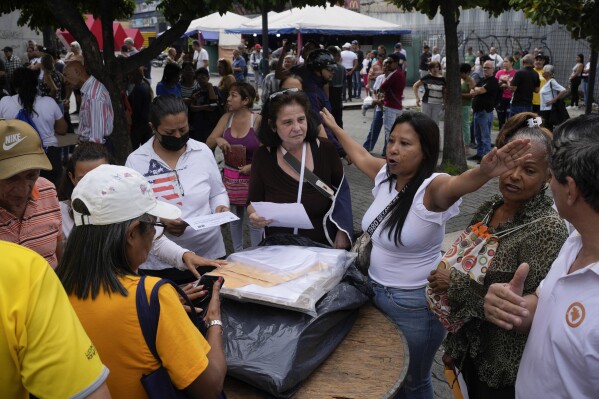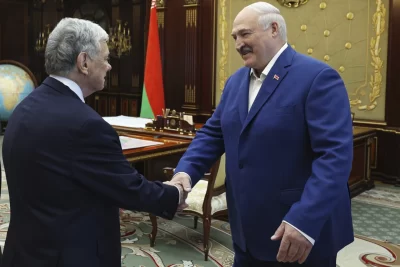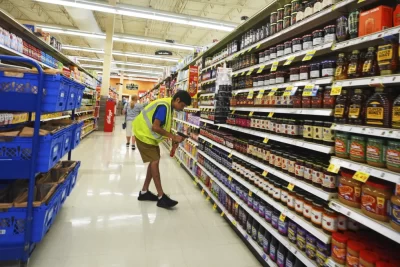
Venezuelans are choosing the candidate they think can end the decade-long, crisis-ridden presidency of Nicolás Maduro, casting ballots in a primary election that the opposition independently organized despite government repression and logistical issues.
Holding Venezuela’s first presidential primary since 2012 required the deeply fractured opposition to work together. But it could prove an exercise in futility, if Maduro’s government so wishes.
While the administration agreed in principle to let the opposition choose its candidate for the 2024 presidential election, it also has already barred the primary’s front-runner, Maria Corina Machado, from running for office. Maduro’s government has in the past bent the law and breached agreements as it sees fit.
Internal and external logistical problems have plagued the opposition contest and were evident Sunday morning.
Voting centers in the capital, Caracas, were not set up by the time people began lining up to vote. Ballots and other materials arrived at some centers after the time polls were scheduled to open.
Voters also were instructed to check their voting center’s location through a website that internet service providers within Venezuela blocked. Some who managed to download a VPN to circumvent internet censorship found their polling place had been relocated.
“For us, it is a great achievement that people have come out; we will just endure the wait,” voter Maria Mendez, 68, said, referring to an estimated two-hour delay that she and about 250 people around her encountered. “We have to choose a candidate. We need a lot of changes. We have faced struggles for many years.”
Mendez receives a pension of about $3.70 a month and depends on her adult children living abroad and in Venezuela to afford her medications. She said she planned to vote for Machado because “she is the only one who has not been involved in controversies.”
Machado, a former lawmaker who supports free-market policies, is a longtime critic of the governing United Socialist Party of Venezuela. She maintained a somewhat low profile for years but dominated the primary campaign by connecting with the same voters she consistently urged to boycott previous elections.
In addition to Machado, nine other candidates remained in the race. The winner is expected to challenge Maduro at the ballot box in the second half of 2024. Maduro is looking to extend his presidency until 2030, which would surpass the time that Hugo Chávez, his mentor, governed.
Maduro’s allies have ridiculed and dismissed the primary all year. Still, both the government and its opponents have used the contest as a bargaining chip to extract concessions from each other as part of a negotiation process meant to end the country’s complex social, economic and political crisis.
Maduro and an opposition faction backed by the U.S. government agreed during the week to work together on basic conditions for the 2024 presidential election. That prompted the government to release six political prisoners and the Biden administration to lift key economic sanctions.
As part of the agreement, Maduro’s administration and the opposition are supposed to “recognize and respect the right of each political actor to select” a presidential candidate freely.
If Machado wins the primary, the focus will shift to Maduro to see if the government reverses its ban on her seeking public office. In June, the government issued an administrative decision prohibiting Machado from running, alleging fraud and tax violations and accusing her of seeking the economic sanctions the U.S. imposed on Venezuela in the last decade.
The U.S., holding up the threat of renewed sanctions, has given Venezuela until the end of November to establish a process for reinstating all candidates expeditiously.
A U.N.-backed panel investigating human rights abuses in Venezuela said last month that Maduro’s government has intensified efforts to curtail democratic freedoms ahead of the 2024 presidential election. That includes subjecting some politicians, human rights defenders and other opponents to detention, surveillance, threats, defamatory campaigns and arbitrary criminal proceedings.
Organizers of the primary have not given an estimate for the voter participation they expect Sunday. All registered voters in the country can participate, as well as some living abroad.
The primary’s first ballot was cast in Sydney, Australia. Voting centers were scheduled to open in dozens of countries.
Within Venezuela, government allies also pressured organizers to relocate voting centers, including by intimidating homeowners.
Fabiola Barrios, one of the local opposition mobilizers in Caracas, said she had already redirected more than four dozen people who showed up at a private school that was supposed to host a voting center in a low-income neighborhood.
She said the center was relocated after members of a violent civilian group allied with the government tried to enter the school days earlier during a campaign event.
“They came to attack us. If you have neighbors, family, tell them that they no longer vote here,” Barrios told a woman who walked to the voting center, where a small sign also redirected voters. “They vote over there.”




